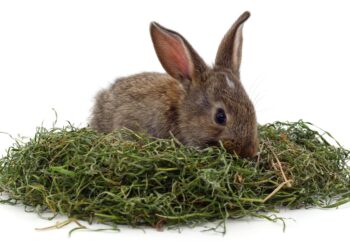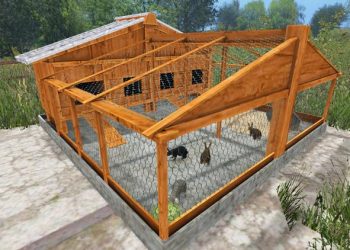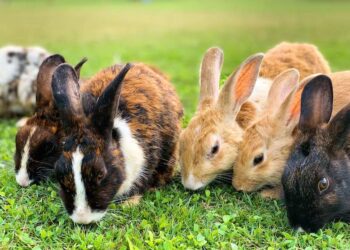Gastrointestinal problems often occur in rabbits. These can have serious consequences if not acted on time. What causes these problems and what can you, as a rabbit owner, do about this yourself?
Nutritional composition
For a rabbit, the nutritional composition is very important. Diarrhea is most common due to nutritional errors. Nutritional errors cause a so-called dysbacteriosis (the bacterial flora in the gastrointestinal tract changes), so that nutrients are no longer absorbed properly and diarrhea occurs. Sudden dietary changes also give rise to diarrhea.
Rabbits need fiber for normal peristalsis of the gastrointestinal tract. The fibers have a low energetic value and are therefore particularly important for peristalsis. Rabbits with diarrhea or anorexia prefer foods that contain fiber. The non-digestible parts ensure cell regeneration, secretion, digestion, absorption, peristalsis, and excretion.
Wrong power supply
The following should not be fed to a rabbit :
- Mixed grains and legumes, cabbage, lettuce, cucumber, tomato, clover, soft fruit.
- Contaminated Grass
- A commercial feed with antibiotic residues
What if you give the wrong food?
Not only diarrhea is a common problem when feeding rabbits incorrectly, but acaecotrophy can also occur. Rabbits make two types of droppings; common droppings and caecotrophs. The difference between them is that caecotrophs are stickier, contain a lot of protein and energy, and are eaten by the rabbit directly from the anus.
If there is incorrect nutrition, the caecotrophs change in structure and composition (aqueous feces are formed), so that the rabbit no longer eats them (acaecotrophy). Acaecotrophy can, in addition to incorrect nutritional composition, also occur by obstruction of caecotrophy;
they have the normal composition, but the rabbit cannot eat them. This may be because the animal is too fat or if the musculoskeletal system is painful.
You can tell that the rabbit is suffering from acaecotrophy if the animal has sticky droppings on the hairs around the anus. It then looks like diarrhea, especially for the owner. It is therefore important to consider this distinction.
Therapy
You should absolutely never fast a rabbit with gastrointestinal problems! It is best to take the animal to the vet, who will then take the rabbit in to observe appetite and stool production. A rabbit with diarrhea or acaecotrophy should be fed unlimited hay and limited pellets.
If the animal does not eat at all, force-feeding and fluid therapy should be used. If necessary, drugs can be administered that stimulate bowel movement. Pain relief can also be given. In the case of acaecotrophy, the rear of the rabbit must be cleaned, by removing the stuck-on poo and possibly cutting some hairs. If the rabbit is too fat, the animal must lose weight.
If the rabbit is fed incorrectly, this must be adjusted. If these tips are followed, the prognosis is favorable. If not, the rabbit (especially in summer) may suffer from myiasis (maggot or larval disease). In this case, the prognosis is a lot less favorable. The vet can try to solve this problem.
The right rabbit food
You should give a rabbit the following to eat:
- Unlimited grass or hay is very important
- Maximum 30 gram/kg/day pellets. These pellets should contain > 18% crude fiber, 12-16% crude protein, and 0.6-1% calcium.
- Lactating nurses and growing young bunnies should be able to eat as much as they want.
- Rabbits should ideally have 3 types of vegetables per day. For this, you can take kale leaves, beet leaves, carrot, carrot leaves, chicory, endive, broccoli, dandelion, plantain, apple, beech, willow.








